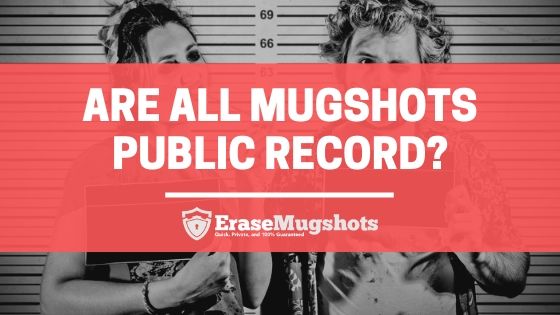100% Satisfaction Guaranteed
We offer a total mugshot removal solution to remove your mugshot and arrest details from the internet once and for all.

Table of Contents
Are all mugshots public records? Learn more about mugshots, public records and what you can do to clean up your online image today.
Are all mugshots public records?
Yes and no, depending on the nature and state of the charges.
For example, if you expunged your criminal charges from the record, those documents are no longer accessible to the public or the government.
Unfortunately, most mugshots and criminal records are public record, unless stated otherwise by the courts.
Many Americans struggle with online mugshots, even if they exist because of a wrongful arrest. But at EraseMugshots, we work to give you a second chance and help you regain your footing online.
In this article, we hope to provide you a better understanding of why mugshots are public records and how you can work to remove yours fast.
In the past, you had to visit your local courthouse to obtain legal documents, such as a mugshot, arrest record, or criminal background report. But in 2021, finding those embarrassing photos is all too easy.
Nearly anyone with an internet connection can locate your address, phone number, email, and other private info in just seconds.
And thanks to the infamous websites like BustedMugshots or Mugshots.com, it is now just as easy to locate your mugshot on the web.
All you have to do is Google your name. Public mugshots can be found within minutes, and there are now a variety of free mugshot search tools at your disposal.
So, let’s dive into how this happened and where your personal information might be hiding online.
All court documents, from government cases to estate deeds, are usually public records. Such documents are registered by a government office and accessible to residents in the local community.
For example, if you’re interested in buying a new home, you can gather the previous owner’s name fairly quickly. You can generally do this by exploring county land reports at your district or county clerk building. And most of the time, these records can be found online.
Yet, certain documents or data may be redacted because they qualify for privacy or confidentiality exemption clauses within a particular state or federal law.
For example, if you browse a free mugshot search tool or free mugshot lookup database, expunged records likely won’t show up.
In 1966, the Freedom of Information Act, or FOIA, became law. FOIA provides you the freedom to collect public records from a federal agency. This even includes the U.S. State Department.
This is despite whether the agency generated or collected those records. And to obtain this data, you must send a signed application or request to the agency in question.
Additionally, you must describe the data you want to obtain in great detail. Truth be told, there is no special form. All you have to do is ask.
Under the FOIA, you can inquire about any public records created or gathered by that specific agency. You may also be asked to pay a fee, although this is rare.

Your freedom to collect reports under FOIA is not without limits. This is why most free mugshots search tools are still around today. There are no laws banning them from distributing your image online.
Certain documents may be excluded from public records under special conditions. For instance, busted mugshots Arizona data will remove any dismissed cases or expunged records upon request.
Mugshots remain public until you expunge or seal your case. Otherwise, it would end in an unwanted invasion of privacy or become a violation of national security.
Commonly, a public record is a report filed with any particular city, county, state, or federal office. In layman’s terms, public records are simply official documents that anyone can access.
Public records also come in many forms. These can include anything from maps and recordings to films, photographs, tapes, software, letters, books, and more.
Court records are a popular version of public records. For instance, if you discover that your next-door neighbor was once convicted for a violent domestic charge, you can request a copy of that court record to learn more about the event.
However, in some cases, these findings can only be found online.
Florida and Maryland permit the general public to search for the following within their database:
You can hunt online for a person’s name, case number, or home address.
What’s more: you can even obtain copies of transcripts from your hearing and trial (Florida only). Additionally, you can use the internet to find bankruptcy info using the national database called PACER.
Mugshots can help searchers trying to find people who are on the run. Mugshots can also warn locals about dangerous individuals once they’ve been released or potentially pose a threat.
So, there is a good reason to share some mugshots.
Our justice system helps ensure transparency, as demanded by the Constitution. Any attempt to hold mugshots privately would end in lawsuits by those affected.
That said, a 2016 federal court ruling ordered federal mugshots to be no longer accessible under the federal FOIA. However, this did not change much.
This is somewhat the perception of the harm that mugshots can create when online. The court clearly states websites that put mugshots online in its analysis. Mugshots.com being one of the leading mugshot publication websites was included on that list.
Some states have passed laws to limit the number of mugshots prior to a conviction. One of these states is New Jersey.
The entire idea of public records is to bypass the government from collecting money from people. It’s also to restrict the abuse of power.
It was understood that making records public would better protect individuals.
But, it may also still create significant harm in our current digital era.
The internet goes both ways: people want to be able to locate whatever information they want. But when the information makes them look bad, there is an uproar.
As U. S. citizens, we have the freedom to identify problems and express ourselves almost without limit.
But allowing others to post negatively about you online can have serious consequences. This includes mugshot sites, which can cause you lasting emotional, financial and career damage.
Mugshots normally begin to surface online at about two weeks after the arrest. Approaching these mugshot publications immediately provides you leverage while helping to remove criminal documents from public records.
With advanced background checks, it is possible that your criminal history will one day reveal itself. Websites such as WhitePages or Spokeo reveal everything from your name, criminal history, relatives, home addresses, and more.
Removing online mugshots and public records is our business.
What’s more: Our mugshot removal team takes steps to de-index those negative links from search results immediately following your mugshot removal.
Generally, it takes Google a week to refresh its search results and show a clean online image.
Read more about how to remove your mugshots and arrest records in Florida.
There are many reasons why you would want to restore your background report to its former glory and clean up bad search results.
To learn more about how to remove public records and mugshots online, please fill out the form below. Our team will contact you as soon as possible.
Learn how to effectively remove mugshots online (especially those on busted mugshots Arizona).
We offer a total mugshot removal solution to remove your mugshot and arrest details from the internet once and for all.